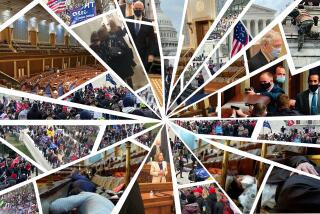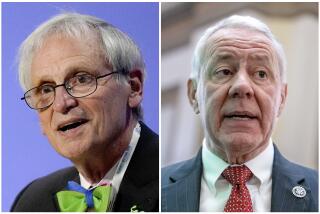Until my arrival, there had never been...
- Share via
Until my arrival, there had never been a black page in the House or Senate. Rep. Barratt O’Hara was a senior representative from Illinois, and he made the appointment for me. I went to Washington and, on my arrival, all of a sudden it seemed like there was a “mistake.”
The word came that there had been a mistake, and my appointment had not been cleared by the leadership. It was unclear who didn’t give approval, but somewhere higher up, O’Hara didn’t get the approval. The assumption was always made that the people who were blocking it were Southerners. But, as it turned out, although no one would ever say officially, I don’t think that was the problem. I think the real blockage came from within the Illinois delegation itself. It got into a real political brouhaha as only Washington can get into.
It was picked up by the national press, and I appeared on the “Today” show and was interviewed by Frank McGee. Finally, several congressmen and a congresswoman got together to help me, because I was literally hung out to dry.
I had left public school in Chicago to come to Washington in January, and all the while this political debate was going on, I wasn’t in school. That made it all the worse, because one of the reasons for my wanting to come to Washington and wanting to be a page was the education.
The public school I was going to in Chicago was a rough, inner-city school. My defense was doing others’ homework so as to not incur their wrath. But I really wanted to be a doctor. I had decided that when I was 6. So my reason for wanting to be a page was to gain access to the school. The Capitol Page School afforded a good education and a good environment, at no cost.
For a brief time, I enrolled in one of the public schools in Washington. Finally, I got access to the Capitol Page School in March. The way the rules were written, it simply says you must be an employee to go to page school. The rules do not say specifically you have to be a page. So four congressmen and one congresswoman got together and decided each one of them would employ me one day a week in their office. No one was in a position to give me a full-time position, but the total of their employment would be full time. No one would challenge a congressman or woman’s ability to appoint someone to their personal staff.
Congressman James Roosevelt, a Democrat from California, was one of the principal organizers. Roosevelt was the eldest son of Franklin Roosevelt. As time went on, some in the group lost their bid for reelection or decided not to seek reelection, but other sponsors, such as Adam Clayton Powell, came along. I always had five people sponsoring me, and I had Roosevelt the entire time.
It was a time when Eisenhower was President, Nixon was Vice President, Lyndon Johnson was the majority leader, Kennedy was an aspiring senator from Massachusetts, George Wallace was the George Wallace of old, and Strom Thurmond was a hard-core Dixiecrat.
Eventually, there was a black page appointee, but it did not happen during the 2 1/2 years I was there. The House and Senate remained steadfast. But, in a lot of respects, the deal that I got from a job standpoint was better.
What pages do for the most part is act as a gofer. You spend a lot of time running up and down the passageways of the House and the Senate like an internal messenger service. The hours are long; you work as long as the House and Senate are in session, and sometimes they’d be in session all night.
What I had the opportunity to do while working in the office was really learn a lot more. It lacked the prestige of being on the floor and being highly visible, but in terms of skills and things it gave me for later life, it was more valuable. I almost always saw the congressman I worked for those days. I met John Kennedy because these were the people around.
I was always very goal driven. For me, while it wasn’t the whole tamale, it was a hell of a lot. I got to be there for the rest of my high school years. The situation created enough controversy and enough sympathy that, if one of my sponsors lost an election or decided not to run again, somebody would always take the spot.
I’ve been lucky. I was fortunate to have the opportunity to be in Washington as a teen-ager. I was fortunate to get into a good college and medical school and training program. Not everyone has that fortune. If you have the good fortune to be doing something that’s not only personally and professionally rewarding and worthwhile to society, you can’t waste the opportunity. Life’s not fair, it’s not entirely just. When you’re given an opportunity, you don’t waste it. It doesn’t always come around a second or third time, and some people never get it.
More to Read
Sign up for Essential California
The most important California stories and recommendations in your inbox every morning.
You may occasionally receive promotional content from the Los Angeles Times.













